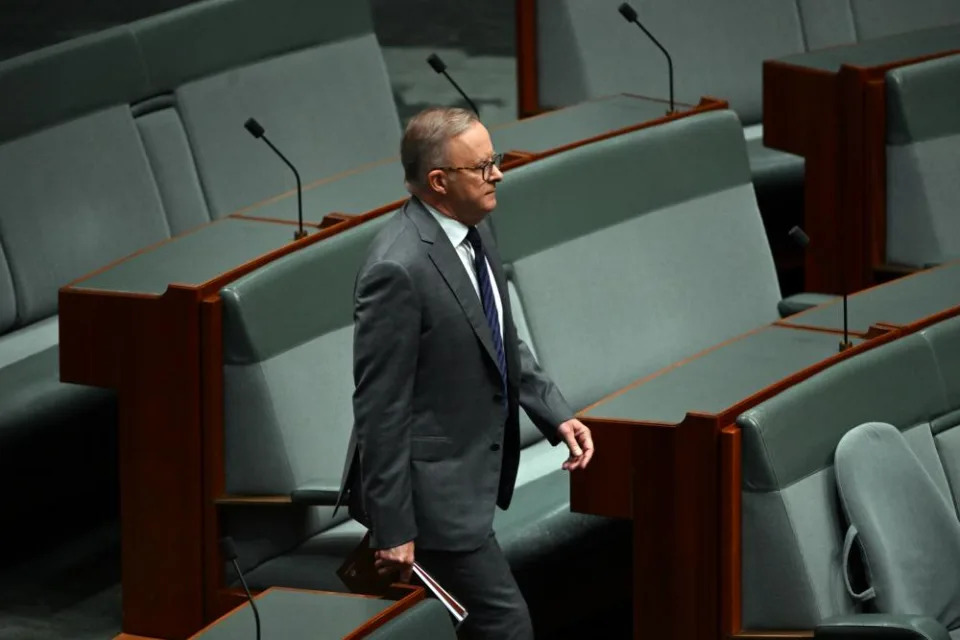RANDALL CHASE
Fri, 17 February 2023

A headline about President Donald Trump is displayed outside Fox News studios, on Nov. 28, 2018, in New York. Attorneys for the cable news giant argued in a counterclaim unsealed, Thursday, Feb. 16, 2023, that a $1.6 billion defamation lawsuit against Fox News by Dominion Voting Systems over the network’s coverage of the 2020 presidential election is an assault on the First Amendment.
(AP Photo/Mark Lennihan, File)
WILMINGTON, Del. (AP) — To millions of viewers, Fox News hosts gave allies of former President Donald Trump a platform to champion false claims that he lost the 2020 election because of voter fraud. To one another, they expressed doubts about the claims and mocked the people making them.
Private exchanges between Fox News hosts Tucker Carlson and Laura Ingraham, and other network bigwigs — including the chairman of Fox Corporation, Rupert Murdoch — show a wide chasm between what the network promoted in primetime and the doubts that its stars held behind the camera, according to new court filings in a defamation lawsuit being waged by a company whose voting systems were regularly maligned on air.
“Sidney Powell is lying” about having evidence for election fraud, Carlson said via text on Nov. 16, 2020 to a Fox News producer, referring to one of Trump’s lawyers.
Ingraham texted Carlson that Powell is “a complete nut. No one will work with her. Ditto with Rudy,” referring to the former New York mayor and Trump supporter Rudy Giuliani.
These and other internal communications were included in a redacted brief filed Thursday by attorneys for Dominion Voting Systems, which is suing Fox News and its parent company, Fox Corporation, for $1.6 billion.
In a deposition, host Sean Hannity said “that whole narrative that Sidney was pushing, I did not believe it for one second,” according to Dominion’s filing.
Murdoch, meanwhile, in a Nov. 19 email, described what he saw in a press conference that day featuring Giuliani and Powell as “Really crazy stuff. And damaging.”
Dominion's legal case rests on its belief that Fox News employees deliberately amplified false claims that the company had changed votes in the 2020 election, and that Fox provided a platform for guests to make false and defamatory statements.
Attorneys for Fox argued in a counterclaim unsealed Thursday that the lawsuit is an assault on the First Amendment. They said Dominion has advanced “novel defamation theories” and is seeking a “staggering” damage figure aimed at generating headlines, chilling protected speech and enriching Dominion’s private equity owner, Staple Street Capital Partners.
“Dominion brought this lawsuit to punish FNN for reporting on one of the biggest stories of the day — allegations by the sitting President of the United States and his surrogates that the 2020 election was affected by fraud,” the counterclaim states. “The very fact of those allegations was newsworthy.”
Fox attorneys have noted that Carlson repeatedly questioned Powell’s claims in his broadcasts. “When we kept pressing, she got angry and told us to stop contacting her,” Carlson told viewers on Nov. 19, 2020.
Fox attorneys say Dominion’s own public relations firm expressed skepticism in December 2020 as to whether the network’s coverage was defamatory. They also point to an email from Oct. 30, 2020, just days before the election, in which Dominion’s director of product strategy and security complained that the company’s products were “just riddled with bugs.”
In their counterclaim, Fox attorneys wrote that when voting-technology companies denied the allegations being made by Trump and his surrogates, Fox News aired those denials, while some Fox News hosts offered protected opinion commentary about Trump’s allegations.
“Freedom of speech and freedom of the press would be illusory if the prevailing side in a public controversy could sue the press for giving a forum to the losing side," Fox attorneys wrote.
Fox attorneys warn that threatening the company with a $1.6 billion judgment will cause other media outlets to think twice about what they report.
Responses by both sides to the briefs made public on Thursday remain under seal. Fox has said Dominion's filing includes “cherry-picked quotes stripped of key context,” and that it has refused to allow Fox to make its response to Dominion's brief public. Attorneys for Fox and Dominion told The Associated Press on Friday that responses to the briefs will remain under seal until Feb. 27.
Dominion on Friday filed its own challenge to the redactions in the briefs, including its own. “Dominion’s position is that nothing in these three briefs warrants confidential treatment,” attorneys for the company wrote, adding that all redactions were done at Fox's request.
If either side can persuade Superior Court Judge Eric Davis to grant summary judgment in its favor, the case will end without a jury trial. If not, the trial is scheduled to begin in mid-April.
In its 192-page brief, Dominion said the judge should rule in its favor because “no reasonable juror could find in Fox’s favor on each element of Dominion’s defamation claim.” Dominion attorneys also assert that no reasonable juror could find in favor of Fox’s “neutral reportage” and “fair report” defenses.
“Recounts and audits conducted by election officials across the U.S. repeatedly confirmed the election’s outcome, including specifically that Dominion’s machines accurately counted votes,” Dominion’s filing states.
Fox News attorneys argue the network’s coverage and commentary are not defamatory and that there is no evidence the hosts had any malicious intent behind what they said about Dominion — an important legal standard in First Amendment cases.
Davis ruled last month that, for the purposes of the defamation claims, he will consider Dominion to be a public figure. That means Dominion must prove by a preponderance of the evidence that the Fox defendants acted with actual malice or reckless disregard for the truth.
WILMINGTON, Del. (AP) — To millions of viewers, Fox News hosts gave allies of former President Donald Trump a platform to champion false claims that he lost the 2020 election because of voter fraud. To one another, they expressed doubts about the claims and mocked the people making them.
Private exchanges between Fox News hosts Tucker Carlson and Laura Ingraham, and other network bigwigs — including the chairman of Fox Corporation, Rupert Murdoch — show a wide chasm between what the network promoted in primetime and the doubts that its stars held behind the camera, according to new court filings in a defamation lawsuit being waged by a company whose voting systems were regularly maligned on air.
“Sidney Powell is lying” about having evidence for election fraud, Carlson said via text on Nov. 16, 2020 to a Fox News producer, referring to one of Trump’s lawyers.
Ingraham texted Carlson that Powell is “a complete nut. No one will work with her. Ditto with Rudy,” referring to the former New York mayor and Trump supporter Rudy Giuliani.
These and other internal communications were included in a redacted brief filed Thursday by attorneys for Dominion Voting Systems, which is suing Fox News and its parent company, Fox Corporation, for $1.6 billion.
In a deposition, host Sean Hannity said “that whole narrative that Sidney was pushing, I did not believe it for one second,” according to Dominion’s filing.
Murdoch, meanwhile, in a Nov. 19 email, described what he saw in a press conference that day featuring Giuliani and Powell as “Really crazy stuff. And damaging.”
Dominion's legal case rests on its belief that Fox News employees deliberately amplified false claims that the company had changed votes in the 2020 election, and that Fox provided a platform for guests to make false and defamatory statements.
Attorneys for Fox argued in a counterclaim unsealed Thursday that the lawsuit is an assault on the First Amendment. They said Dominion has advanced “novel defamation theories” and is seeking a “staggering” damage figure aimed at generating headlines, chilling protected speech and enriching Dominion’s private equity owner, Staple Street Capital Partners.
“Dominion brought this lawsuit to punish FNN for reporting on one of the biggest stories of the day — allegations by the sitting President of the United States and his surrogates that the 2020 election was affected by fraud,” the counterclaim states. “The very fact of those allegations was newsworthy.”
Fox attorneys have noted that Carlson repeatedly questioned Powell’s claims in his broadcasts. “When we kept pressing, she got angry and told us to stop contacting her,” Carlson told viewers on Nov. 19, 2020.
Fox attorneys say Dominion’s own public relations firm expressed skepticism in December 2020 as to whether the network’s coverage was defamatory. They also point to an email from Oct. 30, 2020, just days before the election, in which Dominion’s director of product strategy and security complained that the company’s products were “just riddled with bugs.”
In their counterclaim, Fox attorneys wrote that when voting-technology companies denied the allegations being made by Trump and his surrogates, Fox News aired those denials, while some Fox News hosts offered protected opinion commentary about Trump’s allegations.
“Freedom of speech and freedom of the press would be illusory if the prevailing side in a public controversy could sue the press for giving a forum to the losing side," Fox attorneys wrote.
Fox attorneys warn that threatening the company with a $1.6 billion judgment will cause other media outlets to think twice about what they report.
Responses by both sides to the briefs made public on Thursday remain under seal. Fox has said Dominion's filing includes “cherry-picked quotes stripped of key context,” and that it has refused to allow Fox to make its response to Dominion's brief public. Attorneys for Fox and Dominion told The Associated Press on Friday that responses to the briefs will remain under seal until Feb. 27.
Dominion on Friday filed its own challenge to the redactions in the briefs, including its own. “Dominion’s position is that nothing in these three briefs warrants confidential treatment,” attorneys for the company wrote, adding that all redactions were done at Fox's request.
If either side can persuade Superior Court Judge Eric Davis to grant summary judgment in its favor, the case will end without a jury trial. If not, the trial is scheduled to begin in mid-April.
In its 192-page brief, Dominion said the judge should rule in its favor because “no reasonable juror could find in Fox’s favor on each element of Dominion’s defamation claim.” Dominion attorneys also assert that no reasonable juror could find in favor of Fox’s “neutral reportage” and “fair report” defenses.
“Recounts and audits conducted by election officials across the U.S. repeatedly confirmed the election’s outcome, including specifically that Dominion’s machines accurately counted votes,” Dominion’s filing states.
Fox News attorneys argue the network’s coverage and commentary are not defamatory and that there is no evidence the hosts had any malicious intent behind what they said about Dominion — an important legal standard in First Amendment cases.
Davis ruled last month that, for the purposes of the defamation claims, he will consider Dominion to be a public figure. That means Dominion must prove by a preponderance of the evidence that the Fox defendants acted with actual malice or reckless disregard for the truth.










